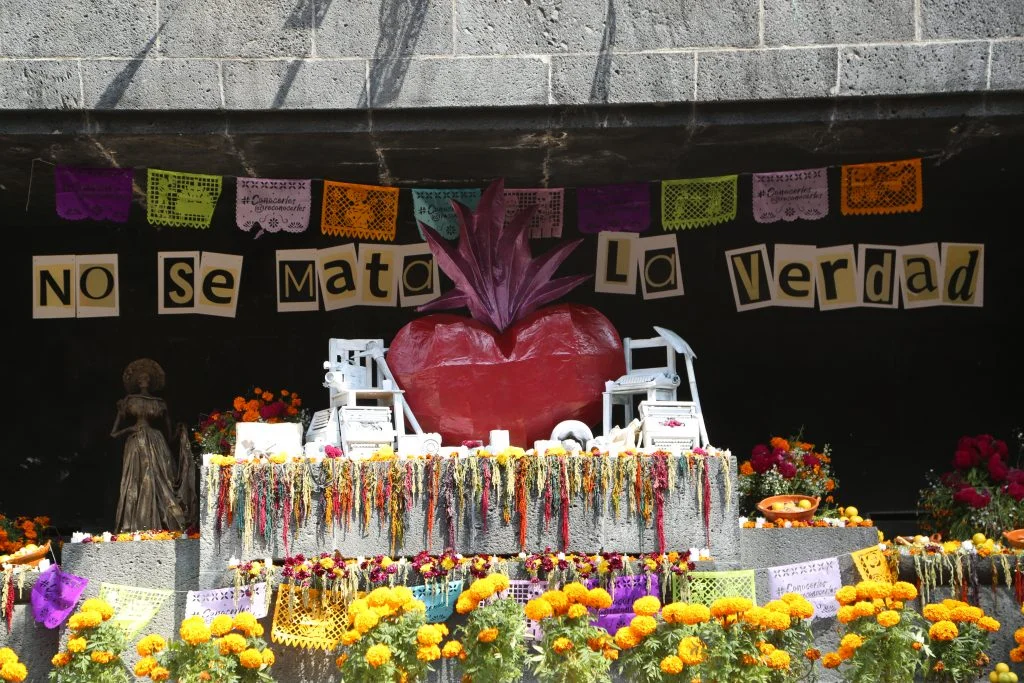#DDHH
Impunity, journalism, and democracy

Offering dedicated to murdered journalists.
© Diana Hernandez Gómez, CIMACIn Mexico, after the wave of violence against the press unleashed years ago, civil society coined the phrase "You don't kill the truth by killing journalists". It is true, truth is not killed: it is assaulted, it is made invisible, its access is made difficult. The stories for which journalists were assaulted or murdered rarely come to light, and insecurity often leads to forced displacement and silence.
Today, November 2, marks the International Day to End Impunity for Crimes against Journalists. In a region where all crimes enjoy high rates of impunity, it might seem that emphasizing one or the other is futile: yes, every crime should be investigated and solved with the same diligence; making it a competition between more and less critical crimes is not only absurd but useless.
Why, then, dedicate an entire day to talk about attacks against the press? To a greater extent, because the effects of crimes against journalists are not only against them, but also against their work and, therefore, against one of the key foundations of democracy: freedom of expression.
During 2021, an aggression against the press was committed every two hours in Latin America. Although there is no precise figure on total impunity, other indicators can give us a clue as to the scope of the phenomenon: 4 out of every 5 murders against journalists during the last ten years have gone unpunished, and in Mexico and Colombia, two of the countries with the most worrying figures, the percentage of unsolved crimes amounts to 98%.
Impunity, unfortunately, transcends the already worrying lack of justice and brings with it other adverse effects: on the one hand, it directly or indirectly censures the truth and, on the other, it is an invitation to follow the same pattern of violence: come, attack journalists, nothing will happen.
The problem is even more worrisome when placed in the context of a new wave of populist and authoritarian regimes in the region that use attacks against the press to legitimize their governments. According to the annual report from Voces del Sur, the arbitrary use of state power against the press tripled and of the total number of alerts of violations against freedom of expression reported in 2021, 72% identify the state as the aggressor.
In Cuba, the main aggressions against the press in the first half of 2022 were official citations, house arrests, suppression of internet service, and arbitrary detentions. Journalists, who have been key players in the protests against the dictatorship, are attacked by the very institution that should protect them. Leaving their cases unresolved is an attack against legality, but it also contributes to disrupting the protest movement that is fighting for democracy, making it increasingly difficult for the regime's abuses to be visible outside the island. Isn't the truth being killed?
Cuba is one of the most extreme cases, but not even countries with relatively consolidated institutions are exempt from repeating the same pattern. In Mexico, so far in 2022 most of the journalists attacked were covering politics, corruption, security and justice, problems that in the current context are urgent to address and that, without a voice to tell them, have a free field to be replicated.
It is impossible to ignore that, in addition to being a problem in itself, the absence of justice in crimes against journalists feeds and is fed by other democratic challenges. Insecurity and violence resulting from impunity prevent journalistic investigations - essential to generate counterweights of power - which leads to institutional erosion and turns into an eternal vicious circle.
If we aspire to stop the cycle, the first step is to understand that crimes against journalists are not only committed against journalists, but also against their readers and listeners who are deprived of the truth. Ending impunity means bringing the truth back to our societies and no process of justice can be complete without it.
